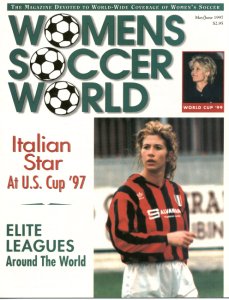Recently Morace broke another barrier. Having scored 99 goals for her
national team she went four games without scoring, and it seemed that a
psychological barrier was developing. Then March 23rd, the Squaddra Azurra
played Greece in a friendly on her home ground at Modena. In the sixth
minute, Morace scored the first goal, in what became a 4-1 victory for
Italy.
In Italy’s national league, “serie A,” Morace’s career is unique. In
nearly 18 years in the national league, she has scored 480 goals in 442
games, and led her team to the league champion position ten times in the
past twelve years. |

With the National
Team in 1993.
|



